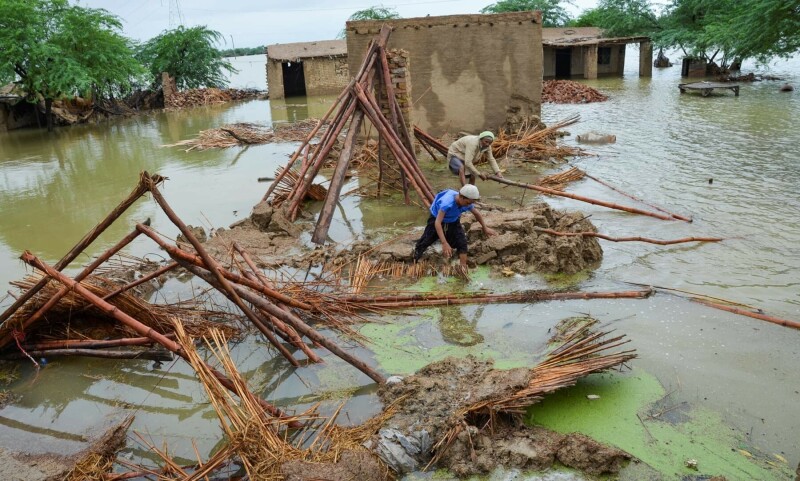Report acknowledges COP29 failed to yield ambitious NCQG on climate finance, calls for greater support by high-emitting countries for most vulnerable nations.
Pakistan has been ranked as the most vulnerable country to climate change in 2022, followed by Belize and Italy, according to data in the Climate Risk Index (CRI) for 2025 report released by European think-tank Germanwatch on Wednesday.
Pakistan’s ranking has been mainly due to the unprecedented floods in 2022, mainly caused by record-breaking monsoon rainfall, Glacial Lake Outburst Floods (GLOFs), and other factors.
The report highlights that over 33 million people were affected and over 1,700 lives were lost due to the floods. It also says that climate change made the severity of extreme monsoon rainfall increase by 50 per cent.
Not only that, over eight million people lost their homes and were internally displaced due to the 2022 floods, while 1.3 million houses were damaged. The issue was compounded by a lack of drinking water availability and a surge in water-borne diseases, such as diarrhoea, cholera, dengue, malaria, and skin infections.
The report notes that before the floods in 2022, Pakistan witnessed severe heatwaves from March to May, which resulted in GLOFs in northern Pakistan and record-breaking monsoon rainfall. According to the Pakistan Meteorological Department (PMD) in August 2022, Pakistan witnessed 243pc more rainfall than usual, making it the wettest August since records began in 1961.
The reconstruction costs for Pakistan have been estimated at $16bn. The report further noted that the 2022 floods may have likely exacerbated gender inequalities, as women who were associated with agriculture and livestock were disproportionately affected.
The report also notes that the lack of collated data in the global south fails to accurately show losses, which affects decision-making. Furthermore, attribution science has revealed that climate change is responsible for making heatwaves in India and Pakistan “30 times more likely”.
Lina Adil, co-author of the Germanwatch report, said, “The main events that led to Pakistan’s ranking as the most affected country for the year 2022 due to extreme weather events in the CRI 2025 were the devastating floods due to unprecedented monsoon rainfall together with the heatwaves in March — May 2022.”
She continued, “Both events – heatwaves and floods – can be attributed to climate change, according to an attribution study done by World Weather Attribution.
“The losses to the GDP were very high — US$15 billion and so were the number of affected people both in absolute and relative terms,” which made Pakistan the number one country in the CRI 2022.
According to Pakistani governmental estimates, the floods incurred losses worth $30bn.
Lina pointed out that Pakistan is the only country in the CRI 2022 list having a National Adaptation Plan, adding: “The question now is of implementation of this plan and other adaptation and other disaster risk reduction plans currently in place in Pakistan.
“It is not just Pakistan but the south and southeast regions [are] exposed to extreme weather events. The first line of defence is for high-emitting countries to significantly reduce carbon emissions, and stop them at the source — if we are to reduce the vulnerability of the countries — this is in parallel to their responsibility to support adaptation and loss and damage efforts in the most vulnerable countries.”
Lina advised the policymakers to identify communities which are most vulnerable and provide them with the necessary support to build their resilience, saying, “We can take lessons from countries like Bangladesh, where due to better adaptation practices, the number of fatalities due to cyclones was significantly reduced.”
“Timely communication of extreme weather events to frontline communities is critical for facilitating swift evacuations and effective disaster risk reduction measures. This must be complemented by strengthened prevention and preparedness strategies in order to enhance resilience and minimize impact,” Adil said.
Climate Risk Index 2025
The number and strength of extreme weather events such as floods, droughts, storms, and heat waves are increasing and gradually becoming the “new normal” in some regions of the world.
The Climate Risk Index 2025, launched by Germanwatch, shows that over the last 30 years, global south countries have been particularly affected by the impacts of extreme weather events.
Interestingly, the United States of America was ranked seventh on this list.
Between 1993 and 2022, more than 9,400 extreme weather events had occurred. These killed almost 800,000 people and caused economic damages totalling US$4.2 trillion.
“Most vulnerable countries are disproportionately affected by the impacts of climate change partly due to their limited financial and technical capabilities to adapt and manage losses and damages,” Adil said.
“Simultaneously, to prevent further loss and damage, countries urgently need to ramp up their mitigation action with new nationally determined contributions to stay below or as close as possible to 1.5C warming, “ they added.
Climate Risk Index 1993-2022
The Climate Risk Index (CRI) 1993-2022 ranks Dominica, China, and Honduras, as the top three countries most affected by climatic impacts. India has been ranked sixth in the index. Whereas, Pakistan has been ranked 56th in the index, with a loss of over 11,000 lives and $4.8bn.
Not just Pakistan, but China and India have also been ranked in the list of the most affected countries in the long-term index for 1993-2022, for experiencing recurring extreme events.
The report acknowledged that COP29 failed to yield an ambitious New Collective Quantified Goal (NCQG) on climate finance, therefore calling for greater support by high-emitting countries for the most vulnerable countries to tackle the climate crisis.
Dean Emeritus at the Boston University Pardee School of Global Studies Professor Adil Najam said, “The big news in this report is that climate change is now a reality for every country and no country is immune from its effects.”
“For 2022, Pakistan was the number one most affected country because of the super floods. However, once you look at the overall index (based on 1993-2022 numbers) Pakistan was at number 56 on the Climate Risk Index, he said.
“In a world where every country is a victim, simply playing the victim card is not a strategy,” he added.
He went on to say, “The developed countries that have historically caused so much of the climate problem have shown no willingness to contribute their due share to solving the climate problem, and this leaves so many of the poorest and most vulnerable countries having to fend for themselves.”
Dr Najam took specific note of the heatwave crisis mentioned in the report and said that “heat is now the highest cause of deaths because of climate-related calamities; this was so even in 2022, the year of Pakistan’s super floods.
“Given that now heat waves have become the regular “fifth season” in Karachi and other major parts of Pakistan and also because this is a problem where a proper response will also make our cities more livable in general, I hope Pakistan will begin also giving this challenge the attention it deserves.”
The ‘new normal’
The report acknowledges that an increase in the intensity and frequency of extreme weather events is “The New Normal”, whereby wildfires in the Amazon since 2005 have engulfed 22 million hectares of forests; heatwaves in Asia, the Mediterranean, and Mexico have severely affected people and ecosystems, and floods in Spain killed 200 people last year. It is feared that by 2050, climate change can bleed the global economy to the tune of $38tr annually.
George Mason University’s Distinguished Professor and Director at George Mason University Center for Climate Change Communication Dr Edward Maibach speaking on the impacts, said, “The people of Pakistan — and many other highly vulnerable countries around the world — are suffering terribly from the impacts of climate change.
“The human carnage will continue to worsen unless humanity rises to the challenge of slowing and stopping climate change and protecting people and communities from unavoidable climate impacts.”
He suggested that the most effective way to slow and stop climate change is to “accelerate the transition away from fossil fuels and to clean renewable energy. The most effective way to protect people and communities from the unavoidable impacts of climate change is to take actions that increase their climate resilience.”
Dr Maibach further noted that every government — national, state and local governments — must rise to these challenges to protect their people.
“Governments in wealthy nations, perhaps especially the United States, have an extra obligation to help governments in low and middle-income countries rise to these challenges. We were most responsible for creating the problem. Therefore, we are most responsible for helping to solve it,” he concluded.
International Centre for Integrated Mountain Development (ICIMOD) Deputy Director General Izabella Koziell commenting on the report said, “This report makes alarming reading: making it clear that the unbearable shocks climate change unleashed on Pakistan in 2022 — that prolonged heatwave; followed by extraordinary monsoon rains with their devastating human and economic cost — is a grim, new normal.”
She went on to say that the report, “also confirms what our science has long shown: that mountain countries are every bit as frontline to the devastating impacts of climate change as coastal communities and small island states. Given the population sizes here, risks here require much, much greater focus globally.”
Koziell also appreciated Pakistan’s disaster risk reduction efforts in the region: “Since 2022, Pakistan has pioneered disaster management and risk reduction in our region, developing absolutely state-of-the-art early warning infrastructure, and playing a generous role, sharing tools and approaches with neighbouring countries that confront similar risks,” she said.
“ICIMOD is proud to be able to play our part in this wider national effort through our Sustainable Actions for Ecosystems Restoration (SAFER) project that targets interventions, especially around water security and adaptive capacity, at the most vulnerable populations along the Indus (river).”
On the steps needed to make Pakistan more resilient to climatic impacts, Koziell suggested, “We urgently need to do more, and there must be a massive increase in flows of finance for adaptation into Pakistan and the region. Ultimately, however, as this report indicates, adaptation needs will outstrip our capacity to cope unless much, much faster mitigation action is taken now.”
The writer is an international award-winning environmental journalist and is currently pursuing a PhD in communication at George Mason University, US. He tweets @SyedMAbubakar and can be reached via s.m.abubakar@hotmail.com
- Desk Reporthttps://foresightmags.com/author/admin/










